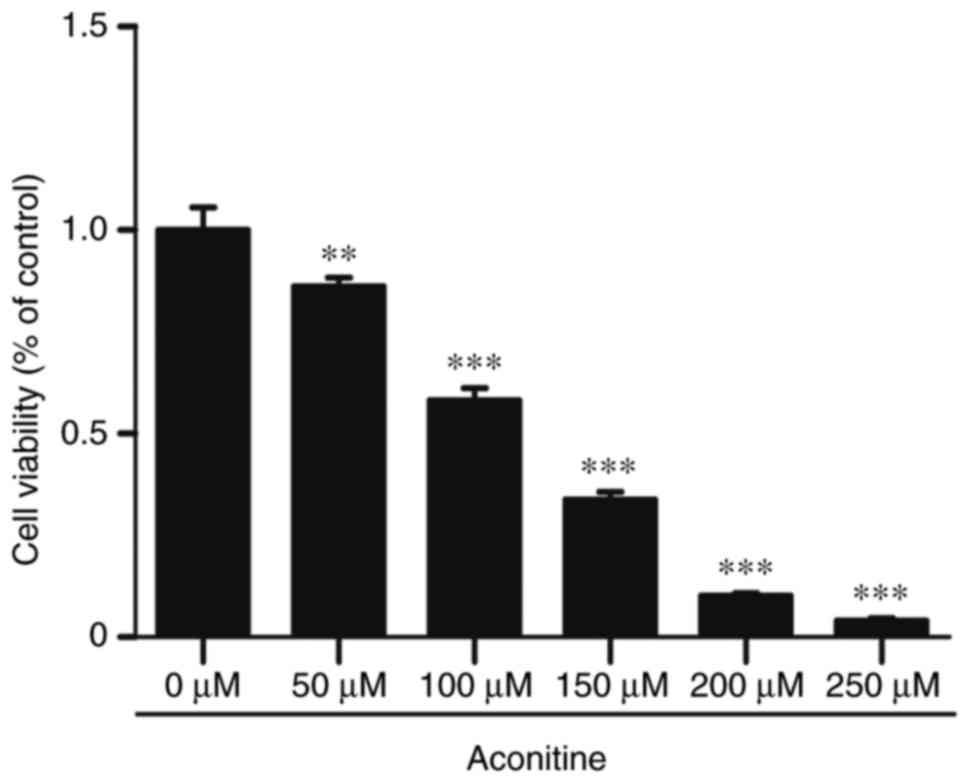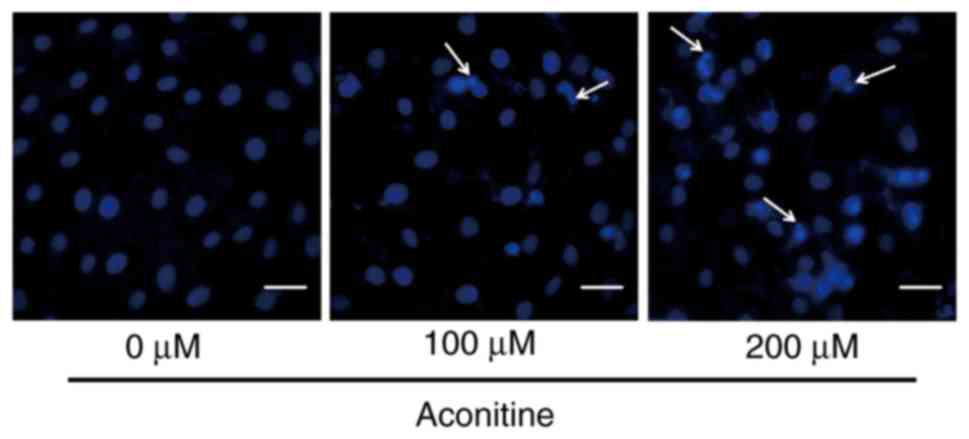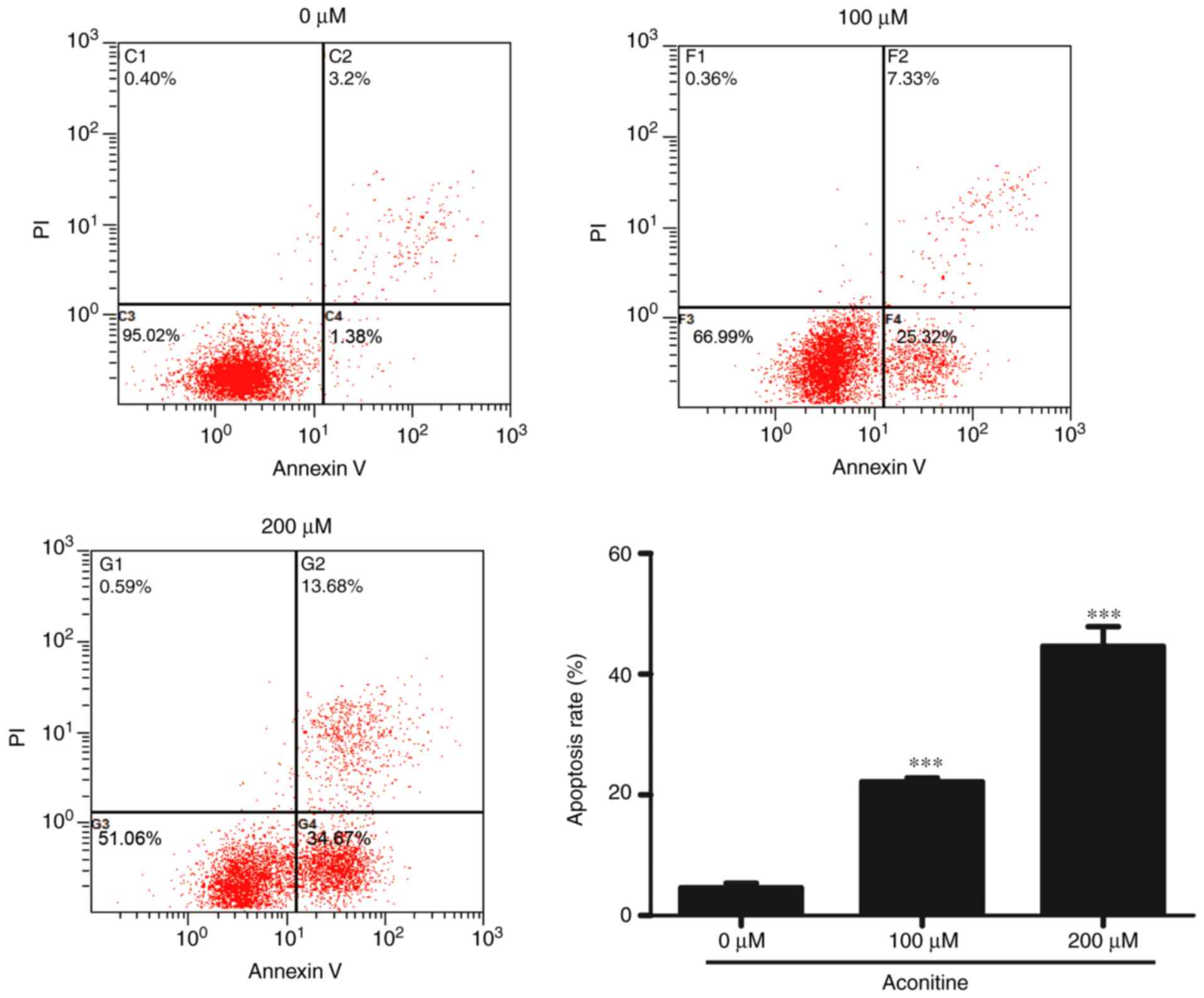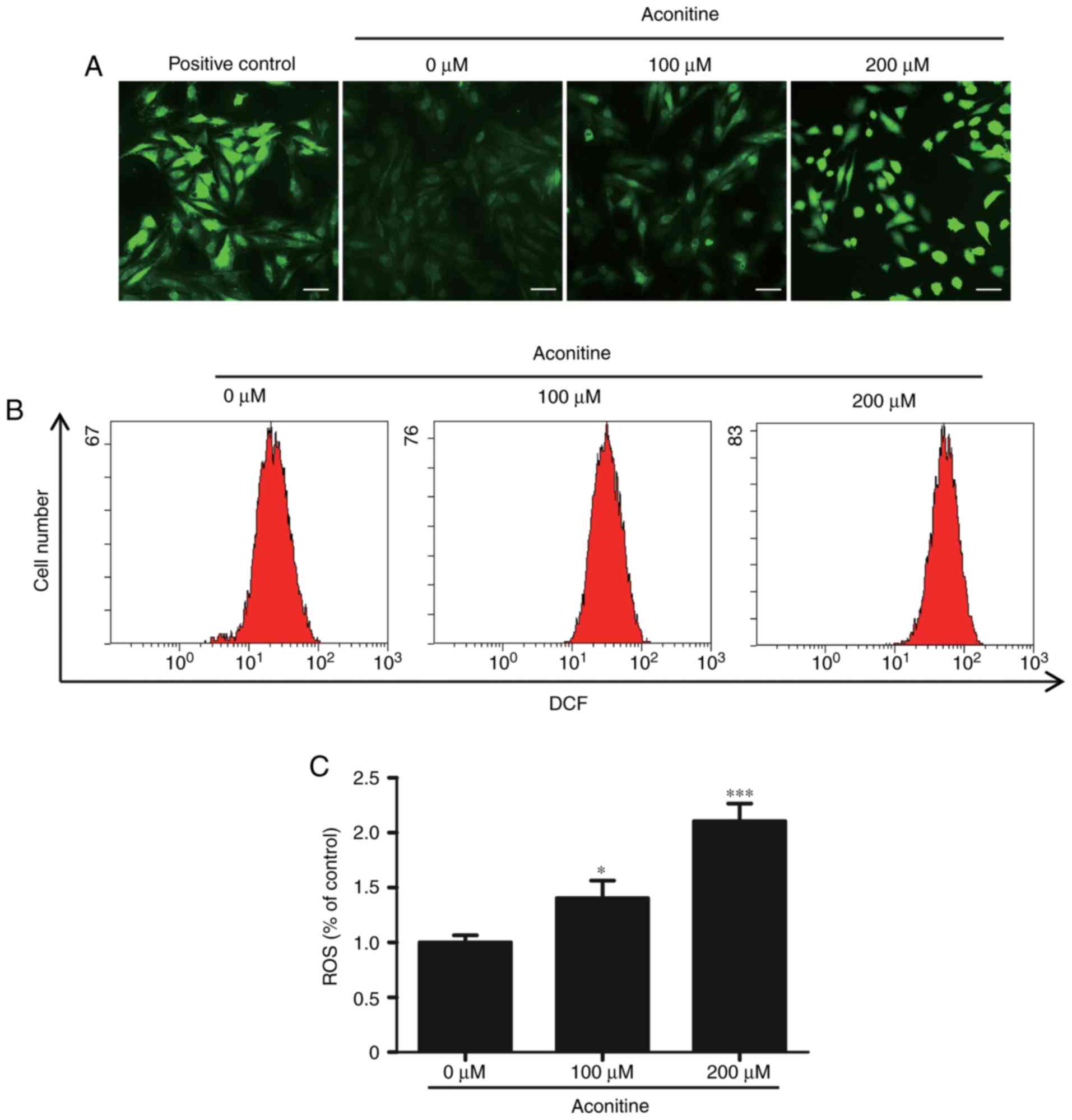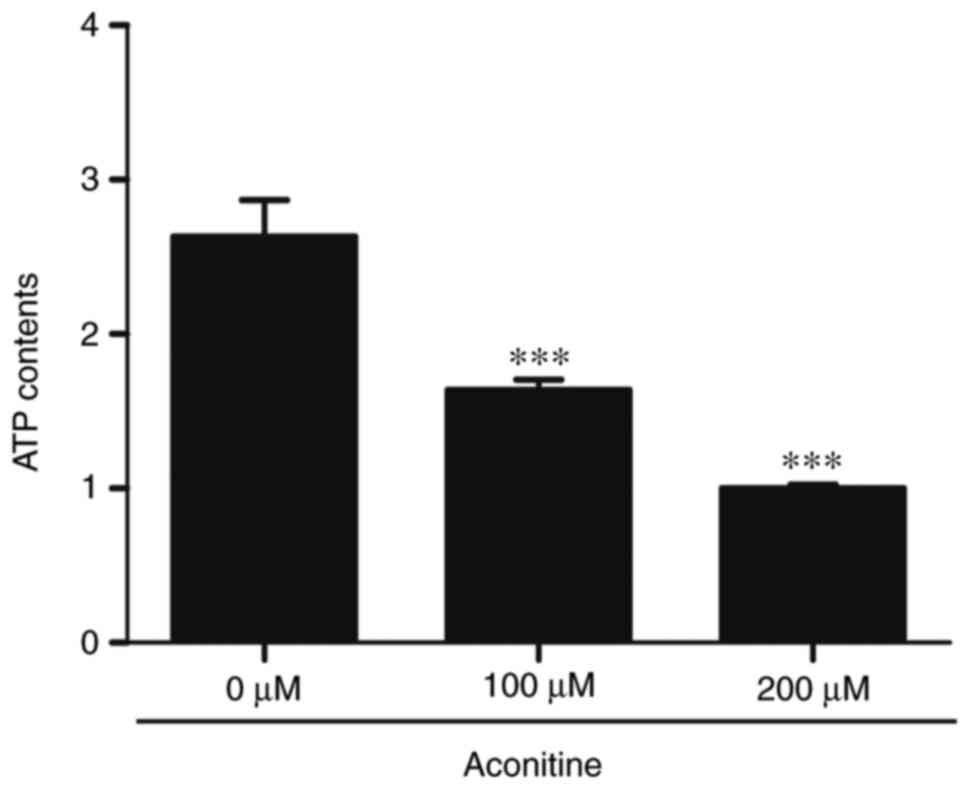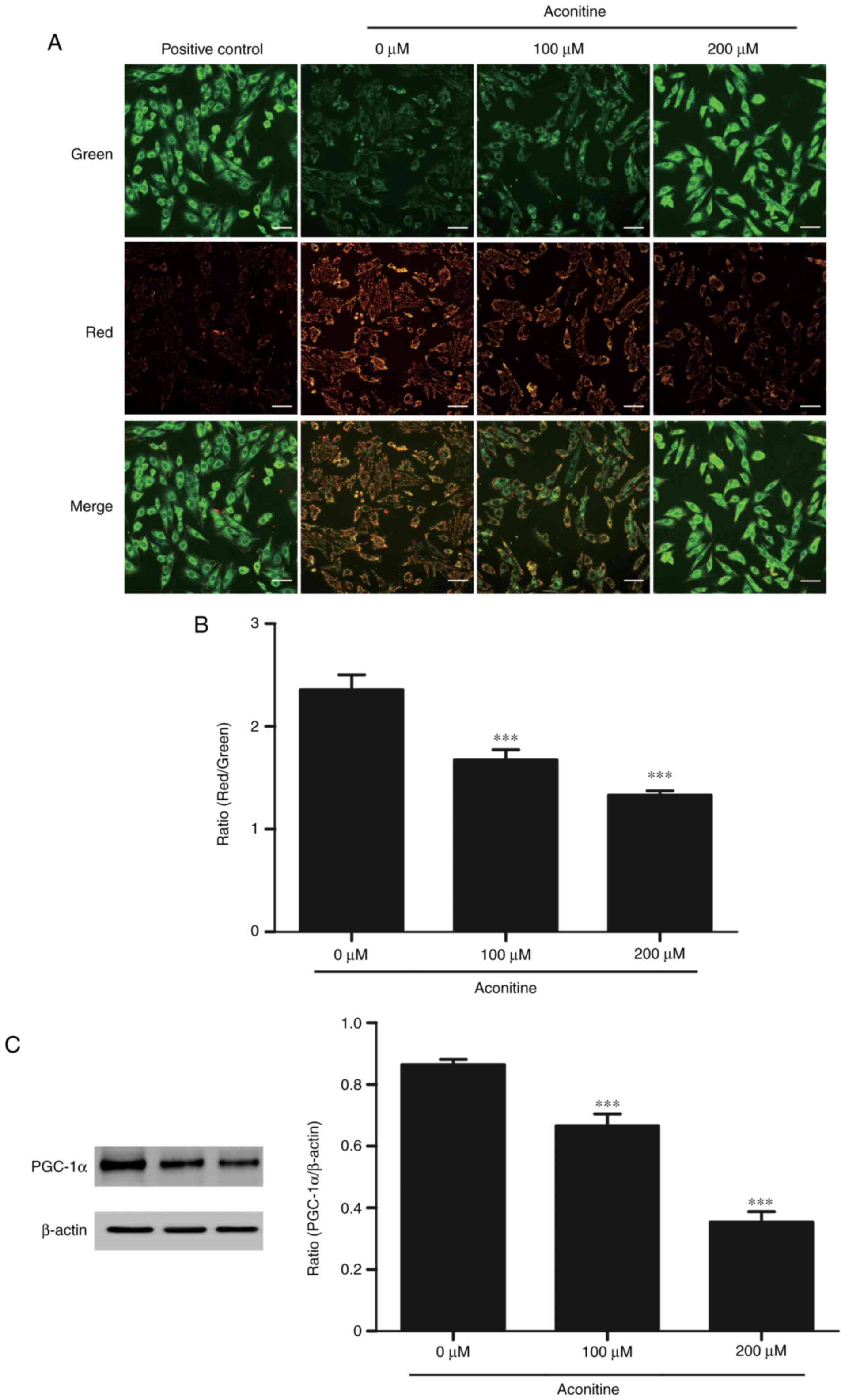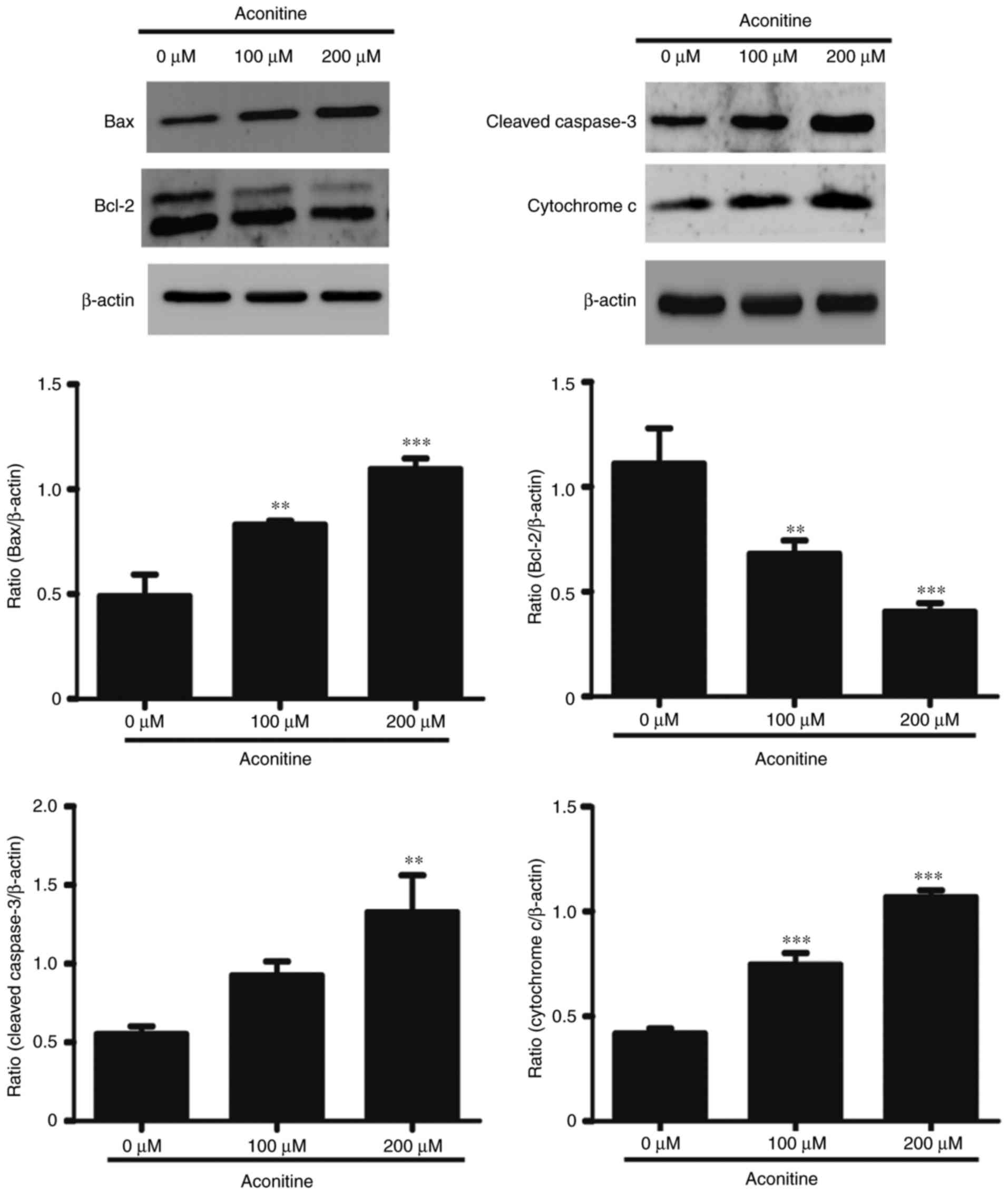|
1
|
Chen JH, Lee CY, Liau BC, Lee MR, Jong TT
and Chiang ST: Determination of aconitine-type alkaloids as markers
in fuzi (Aconitum carmichaeli) by LC/(+)ESI/MS(3). J Pharm Biomed
Anal. 48:1105–1111. 2008. View Article : Google Scholar : PubMed/NCBI
|
|
2
|
Hikino H, Murakami M, Konno C and Watanabe
H: Determination of aconitine alkaloids in aconitum roots. Planta
Med. 48:67–71. 1983. View Article : Google Scholar : PubMed/NCBI
|
|
3
|
Li X, Gu L, Yang L, Zhang D and Shen J:
Aconitine: A potential novel treatment for systemic lupus
erythematosus. J Pharmacol Sci. 133:115–121. 2017. View Article : Google Scholar : PubMed/NCBI
|
|
4
|
Wang X, Wang H, Zhang A, Lu X, Sun H, Dong
H and Wang P: Metabolomics study on the toxicity of aconite root
and its processed products using ultraperformance
liquid-chromatography/electrospray-ionization synapt
high-definition mass spectrometry coupled with pattern recognition
approach and ingenuity pathways analysis. J Proteome Res.
11:1284–1301. 2012. View Article : Google Scholar : PubMed/NCBI
|
|
5
|
Li TF, Gong N and Wang YX: Ester
hydrolysis differentially reduces aconitine-induced
anti-hypersensitivity and acute neurotoxicity: Involvement of
spinal microglial dynorphin expression and implications for
aconitum processing. Front Pharmacol. 7:3672016. View Article : Google Scholar : PubMed/NCBI
|
|
6
|
Fujita Y, Terui K, Fujita M, Kakizaki A,
Sato N, Oikawa K, Aoki H, Takahashi K and Endo S: Five cases of
aconite poisoning: Toxicokinetics of aconitines. J Anal Toxicol.
31:132–137. 2007. View Article : Google Scholar : PubMed/NCBI
|
|
7
|
Pullela R, Young L, Gallagher B, Avis SP
and Randell EW: A case of fatal aconitine poisoning by Monkshood
ingestion. J Forensic Sci. 53:491–494. 2008. View Article : Google Scholar : PubMed/NCBI
|
|
8
|
Arlt EM, Keller T, Wittmann H and
Monticelli F: Fatal aconitine intoxication or thyroid storm? A case
report. Leg Med (Tokyo). 14:154–156. 2012. View Article : Google Scholar : PubMed/NCBI
|
|
9
|
Liu XX, Jian XX, Cai XF, Chao RB, Chen QH,
Chen DL, Wang XL and Wang FP: Cardioactive C19-diterpenoid
alkaloids from the lateral roots of Aconitum carmichaeli ‘Fu Zi’.
Chem Pharm Bull (Tokyo). 60:144–149. 2012. View Article : Google Scholar : PubMed/NCBI
|
|
10
|
Zhu L, Wu J, Zhao M, Song W, Qi X, Wang Y,
Lu L and Liu Z: Mdr1a plays a crucial role in regulating the
analgesic effect and toxicity of aconitine by altering its
pharmacokinetic characteristics. Toxicol Appl Pharmacol. 320:32–39.
2017. View Article : Google Scholar : PubMed/NCBI
|
|
11
|
Ono T, Hayashida M, Tezuka A, Hayakawa H
and Ohno Y: Antagonistic effects of tetrodotoxin on
aconitine-induced cardiac toxicity. J Nippon Med Sch. 80:350–361.
2013. View Article : Google Scholar : PubMed/NCBI
|
|
12
|
Wright SN: Comparison of
aconitine-modified human heart (hH1) and rat skeletal (mu1) muscle
Na+ channels: An important role for external Na+ ions. J Physiol.
538:759–771. 2002. View Article : Google Scholar : PubMed/NCBI
|
|
13
|
Wang SY and Wang GK: Voltage-gated sodium
channels as primary targets of diverse lipid-soluble neurotoxins.
Cell Signal. 15:151–159. 2003. View Article : Google Scholar : PubMed/NCBI
|
|
14
|
Wu SN, Chen BS and Lo YC: Evidence for
aconitine-induced inhibition of delayed rectifier K(+) current in
Jurkat T-lymphocytes. Toxicology. 289:11–18. 2011. View Article : Google Scholar : PubMed/NCBI
|
|
15
|
Fu M, Wu M, Wang JF, Qiao YJ and Wang Z:
Disruption of the intracellular Ca2+ homeostasis in the cardiac
excitation-contraction coupling is a crucial mechanism of
arrhythmic toxicity in aconitine-induced cardiomyocytes. Biochem
Biophys Res Commun. 354:929–936. 2007. View Article : Google Scholar : PubMed/NCBI
|
|
16
|
Zhou YH, Piao XM, Liu X, Liang HH, Wang
LM, Xiong XH, Wang L, Lu YJ and Shan HL: Arrhythmogenesis toxicity
of aconitine is related to intracellular ca(2+) signals. Int J Med
Sci. 10:1242–1249. 2013. View Article : Google Scholar : PubMed/NCBI
|
|
17
|
Sun GB, Sun H, Meng XB, Hu J, Zhang Q, Liu
B, Wang M, Xu HB and Sun XB: Aconitine-induced Ca2+ overload causes
arrhythmia and triggers apoptosis through p38 MAPK signaling
pathway in rats. Toxicol Appl Pharmacol. 279:8–22. 2014. View Article : Google Scholar : PubMed/NCBI
|
|
18
|
Ji BL, Xia LP, Zhou FX, Mao GZ and Xu LX:
Aconitine induces cell apoptosis in human pancreatic cancer via
NF-κB signaling pathway. Eur Rev Med Pharmacol Sci. 20:4955–4964.
2016.PubMed/NCBI
|
|
19
|
Kakkar P and Singh BK: Mitochondria: A hub
of redox activities and cellular distress control. Mol Cell
Biochem. 305:235–253. 2007. View Article : Google Scholar : PubMed/NCBI
|
|
20
|
Kroemer G, Dallaporta B and Resche-Rigon
M: The mitochondrial death/life regulator in apoptosis and
necrosis. Annu Rev Physiol. 60:619–642. 1998. View Article : Google Scholar : PubMed/NCBI
|
|
21
|
Won JC, Park JY, Kim YM, Koh EH, Seol S,
Jeon BH, Han J, Kim JR, Park TS, Choi CS, et al: Peroxisome
proliferator-activated receptor-gamma coactivator 1-alpha
overexpression prevents endothelial apoptosis by increasing ATP/ADP
translocase activity. Arterioscler Thromb Vasc Biol. 30:290–297.
2010. View Article : Google Scholar : PubMed/NCBI
|
|
22
|
Garnier A, Fortin D, Deloménie C, Momken
I, Veksler V and Ventura-Clapier R: Depressed mitochondrial
transcription factors and oxidative capacity in rat failing cardiac
and skeletal muscles. J Physiol. 551:491–501. 2003. View Article : Google Scholar : PubMed/NCBI
|
|
23
|
Patten IS and Arany Z: PGC-1 coactivators
in the cardiovascular system. Trends Endocrinol Metab. 23:90–97.
2012. View Article : Google Scholar : PubMed/NCBI
|
|
24
|
Sihag S, Cresci S, Li AY, Sucharov CC and
Lehman JJ: PGC-1alpha and ERRalpha target gene downregulation is a
signature of the failing human heart. J Mol Cell Cardiol.
46:201–212. 2009. View Article : Google Scholar : PubMed/NCBI
|
|
25
|
Ding F, Shao ZW, Yang SH, Wu Q, Gao F and
Xiong LM: Role of mitochondrial pathway in compression-induced
apoptosis of nucleus pulposus cells. Apoptosis. 17:579–590. 2012.
View Article : Google Scholar : PubMed/NCBI
|
|
26
|
Babbitt SE, Sutherland MC, Francisco San
B, Mendez DL and Kranz RG: Mitochondrial cytochrome c biogenesis:
No longer an enigma. Ternds Biochem Sci. 40:446–455. 2015.
View Article : Google Scholar
|
|
27
|
Wei H, Li Z, Hu S, Chen X and Cong X:
Apoptosis of mesenchymal stem cells induced by hydrogen peroxide
concerns both endoplasmic reticulum stress and mitochondrial death
pathway through regulation of caspases, p38 and JNK. J Cell
Biochem. 111:967–978. 2010. View Article : Google Scholar : PubMed/NCBI
|
|
28
|
Zhang P, Zhang F, Wang Z, Jiang Y and Lu
Y: Simultaneous determination of four trace aconitum alkaloids in
urine using ultra performance liquid chromatography-mass
spectrometry. Se Pu. 31:211–217. 2013.(In Chinese). PubMed/NCBI
|
|
29
|
Lin CC, Chan TY and Deng JF: Clinical
features and management of herb-induced aconitine poisoning. Ann
Emerg Med. 43:574–579. 2004. View Article : Google Scholar : PubMed/NCBI
|
|
30
|
Riba A, Deres L, Eros K, Szabo A, Magyar
K, Sumegi B, Toth K, Halmosi R and Szabados E: Doxycycline protects
against ROS-induced mitochondrial fragmentation and ISO-induced
heart failure. PLoS One. 12:e01751952017. View Article : Google Scholar : PubMed/NCBI
|
|
31
|
Schilling JD: The mitochondria in diabetic
heart failure: From pathogenesis to therapeutic promise. Antioxid
Redox Signal. 22:1515–1526. 2015. View Article : Google Scholar : PubMed/NCBI
|
|
32
|
Ong SB, Subrayan S, Lim SY, Yellon DM,
Davidson SM and Hausenloy DJ: Inhibiting mitochondrial fission
protects the heart against ischemia/reperfusion injury.
Circulation. 121:2012–2022. 2010. View Article : Google Scholar : PubMed/NCBI
|
|
33
|
Jayaraman S: Flow cytometric determination
of mitochondrial membrane potential changes during apoptosis of T
lymphocytic and pancreatic beta cell lines: Comparison of
tetramethylrhodamineethylester (TMRE), chloromethyl-X-rosamine
(H2-CMX-Ros) and MitoTracker Red 580 (MTR580). J Immunol Methods.
306:68–79. 2005. View Article : Google Scholar : PubMed/NCBI
|
|
34
|
Pourahmad J and O'Brien PJ: A comparison
of hepatocyte cytotoxic mechanisms for Cu2+ and Cd2+. Toxicology.
143:263–273. 2000. View Article : Google Scholar : PubMed/NCBI
|
|
35
|
Shih CM, Ko WC, Wu JS, Wei YH, Wang LF,
Chang EE, Lo TY, Cheng HH and Chen CT: Mediating of
caspase-independent apoptosis by cadmium through the
mitochondria-ROS pathway in MRC-5 fibroblasts. J Cell Biochem.
91:384–397. 2004. View Article : Google Scholar : PubMed/NCBI
|
|
36
|
Huss JM and Kelly DP: Nuclear receptor
signaling and cardiac energetics. Circ Res. 95:568–578. 2004.
View Article : Google Scholar : PubMed/NCBI
|
|
37
|
Russell LK, Mansfield CM, Lehman JJ,
Kovacs A, Courtois M, Saffitz JE, Medeiros DM, Valencik ML,
McDonald JA and Kelly DP: Cardiac-specific induction of the
transcriptional coactivator peroxisome proliferator-activated
receptor gamma coactivator-1 alpha promotes mitochondrial
biogenesis and reversible cardiomyopathy in a developmental
stage-dependent manner. Circ Res. 94:525–533. 2004. View Article : Google Scholar : PubMed/NCBI
|
|
38
|
Luo G, Xu X, Guo W, Luo C, Wang H, Meng X,
Zhu S and Wei Y: Neuropeptide Y damages the integrity of
mitochondrial structure and disrupts energy metabolism in cultured
neonatal rat cardiomyocytes. Peptides. 71:162–169. 2015. View Article : Google Scholar : PubMed/NCBI
|
|
39
|
Hou Q, Cymbalyuk E, Hsu SC, Xu M and Hsu
YT: Apoptosis modulatory activities of transiently expressed Bcl-2:
Roles in cytochrome C release and Bax regulation. Apoptosis.
8:617–629. 2003. View Article : Google Scholar : PubMed/NCBI
|
|
40
|
Won SJ, Chung KS, Ki YS, Choi JH, Cho WJ
and Lee KT: CWJ-081, a novel 3-arylisoquinoline derivative, induces
apoptosis in human leukemia HL-60 cells partially involves reactive
oxygen species through c-Jun NH2-terminal kinase pathway. Bioorg
Med Chem Lett. 20:6447–6451. 2010. View Article : Google Scholar : PubMed/NCBI
|
|
41
|
Zhao YY, Shen X, Chao X, Ho CC, Cheng XL,
Zhang Y, Lin RC, Du KJ, Luo WJ, Chen JY and Sun WJ:
Ergosta-4,6,8(14),22-tetraen-3-one induces G2/M cell cycle arrest
and apoptosis in human hepatocellular carcinoma HepG2 cells.
Biochim Biophys Acta. 1810:384–390. 2011. View Article : Google Scholar : PubMed/NCBI
|
|
42
|
Olson M and Kornbluth S: Mitochondria in
apoptosis and human disease. Curr Mol Med. 1:91–122. 2001.
View Article : Google Scholar : PubMed/NCBI
|
|
43
|
Elmore S: Apoptosis: A review of
programmed cell death. Toxicol Pathol. 35:495–516. 2007. View Article : Google Scholar : PubMed/NCBI
|
|
44
|
Khazaei S, Ramachandran V, Hamid Abdul R,
Mohd Esa N, Etemad A, Moradipoor S and Ismail P: Flower extract of
Allium atroviolaceum triggered apoptosis, activated caspase-3 and
down-regulated antiapoptotic Bcl-2 gene in HeLa cancer cell line.
Biomed Pharmacother. 89:1216–1226. 2017. View Article : Google Scholar : PubMed/NCBI
|
|
45
|
Hardwick JM, Chen YB and Jonas EA:
Multipolar functions of BCL-2 proteins link energetics to
apoptosis. Trends Cell Biol. 22:318–328. 2012. View Article : Google Scholar : PubMed/NCBI
|
|
46
|
Rao SR, Sundararajan S, Subbarayan R and
Girija Murugan D: Cyclosporine-A induces endoplasmic reticulum
stress and influences pro-apoptotic factors in human gingival
fibroblasts. Mol Cell Biochem. 429:179–185. 2017. View Article : Google Scholar : PubMed/NCBI
|
|
47
|
Saelens X, Festjens N, Vande Walle L, van
Gurp M, van Loo G and Vandenabeele P: Toxic proteins released from
mitochondria in cell death. Oncogene. 23:2861–2874. 2004.
View Article : Google Scholar : PubMed/NCBI
|
|
48
|
Huang QR, Li Q, Chen YH, Li L, Liu LL, Lei
SH, Chen HP, Peng WJ and He M: Involvement of anion exchanger-2 in
apoptosis of endothelial cells induced by high glucose through an
mPTP-ROS-Caspase-3 dependent pathway. Apoptosis. 15:693–704. 2010.
View Article : Google Scholar : PubMed/NCBI
|
|
49
|
Ravindran J, Gupta N, Agrawal M, Bhaskar
Bala AS and Rao Lakshmana PV: Modulation of ROS/MAPK signaling
pathways by okadaic acid leads to cell death via, mitochondrial
mediated caspase-dependent mechanism. Apoptosis. 16:145–161. 2011.
View Article : Google Scholar : PubMed/NCBI
|
|
50
|
Feilchenfeldt J, Bründler MA, Soravia C,
Tötsch M and Meier CA: Peroxisome proliferator-activated receptors
(PPARs) and associated transcription factors in colon cancer:
Reduced expression of PPARgamma-coactivator 1 (PGC-1). Cancer Lett.
203:25–33. 2004. View Article : Google Scholar : PubMed/NCBI
|
|
51
|
Jiang WG, Douglas-Jones A and Mansel RE:
Expression of peroxisome-proliferator activated receptor-gamma
(PPARgamma) and the PPARgamma co-activator, PGC-1, in human breast
cancer correlates with clinical outcomes. Int J Cancer.
106:752–757. 2003. View Article : Google Scholar : PubMed/NCBI
|
|
52
|
Zhang Y, Ba Y, Liu C, Sun G, Ding L, Gao
S, Hao J, Yu Z, Zhang J, Zen K, et al: PGC-1alpha induces apoptosis
in human epithelial ovarian cancer cells through a
PPARgamma-dependent pathway. Cell Res. 17:363–373. 2007. View Article : Google Scholar : PubMed/NCBI
|
|
53
|
Yang Y, Zhang H, Li X, Yang T and Jiang Q:
Effects of PPARα/PGC-1α on the myocardial energy metabolism during
heart failure in the doxorubicin induced dilated cardiomyopathy in
mice. Int J Clin Exp Med. 7:2435–2442. 2014.PubMed/NCBI
|
|
54
|
Yang Y, Zhang H, Li X, Yang T and Jiang Q:
Effects of PPARα/PGC-1α on the energy metabolism remodeling and
apoptosis in the doxorubicin induced mice cardiomyocytes in vitro.
Int J Clin Exp Pathol. 8:12216–12224. 2015.PubMed/NCBI
|















